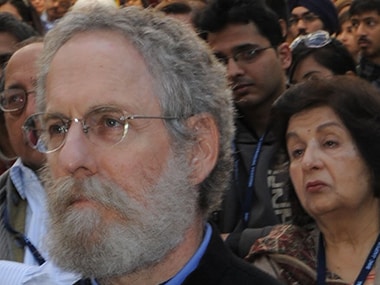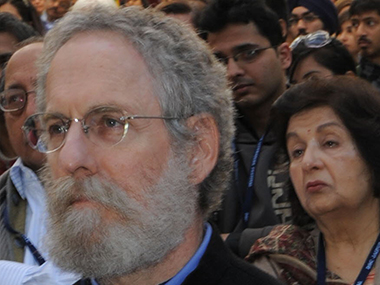In an angry response to Sheldon Pollock expressing his support for the sloganeers of Jawaharlal Nehru University (JNU), 132 Indian academics from various fields, former Government of India officials, and over 11,000 others petitioned for the American academic to be removed from his position as the General Editor of the Murty Classical Library of India (MCLI). Pollock, the Arvind Raghunathan Professor of Sanskrit and South Asian Studies at Columbia University, has held the position since a generous $5.2 million grant by Rohan Murty, son of Infosys co-founder Narayana Murthy, established the series in 2010. Two things are striking about the petition: The first is that it it took the petitioners six years to notice Pollock’s position as the editorial supremo of the MCLI. This may be accounted for by considering that it is never too late to correct a mistake, if Pollock’s appointment is indeed a mistake. Nonetheless, it puts in grave doubt any pretense of an academic objection to Pollock, however merited one might be. In fact, the petitioners even concede that he is a reputed philologist. [caption id=“attachment_2656290” align=“alignleft” width=“380”]  Sheldon Pollock. AFP[/caption] The second thing is the timing of the petition: Immediately after the American scholar had signed a letter himself, condemning what he saw as a stifling of academic and personal expression in JNU by the Indian government. Indeed, the petition mentions that as one of its grievances against Pollock as the petitioners are concerned that it indicates not just disrespect to the unity of India but also that such an unsympathetic view of the culture may bias his research. One wonders if such concerns would have arisen had the condemnation occurred when the United Progressive Alliance was in power and the cartoonist Aseem Trivedi was booked for sedition in September 2012. Or if there even was a condemnation of the government then. In any case, Pollock’s sympathy for India or the lack thereof is hardly a relevant criterion for translations of Sanskrit works. Although the petition is no more than a farce, there is a point to be considered: many Indians have accused Western scholars of being unsympathetic to Hinduism, that they would understand it better if they lived the culture rather than attempt to dissect it clinically. To translate exoticism to plain English, they argue that Hinduism does not comport to a Western modernist framework. Translations are not a simple swapping out of words of one language for another; they carry not just meaning but values. Dharma is not religion, nor is bhakti about faith; caste, one of the most widely associated words with Hinduism, has no exact equivalent either. With an entirely different historical evolution, it is difficult to see how the theories of Western thinkers such as Julia Kristeva, Nicos Poulantzas, Hélène Cixous, or Derrick Bell could explain India. Consider for example, the following sentence and its four variants: I don’t think you’re a thief; I don’t think you’re a thief; I don’t think you’re a thief; I don’t think you’re a thief. The mere tone of the speaker can convey a very different meaning to the listener that the reader is unaware of without context. It is a similar sensitivity that some Indian scholars are concerned that Western academics lack, especially when anachronistic social theories are at play. Of course, as a private donor and a private university, neither Murty nor Harvard University are answerable to the petitioners. Several other Indian millionaires have also donated generously to American or British universities — Ratan Tata gave $50 million to Harvard and Anand Mahindra has given $10 million. Generosity towards Indian universities has usually been directed towards the sciences and much smaller in scale. For example, Nandan Nilekani, former CEO of Infosys, donated $2.7 million to his alma mater, IIT Bombay, and Prabhakant Sinha, co-founder of ZS Associates, contributed $2 million to his own alma mater. Why do Indian business magnates shy away from showing their largesse to humanities departments in their own country as some have suggested they do? One reason could be that there are no good departments in the humanities in India. As, ironically, Pollock has pointed out on several occasions, Indian liberal arts departments lack scholarly publications, important journals, or anything that would be worthy of building upon. Projects like the MCLI, Clay Sanskrit Library, or the Loeb Classical Library require an excellent infrastructure of academic life that is simply not present in India in terms of professors, students, or library collections. There would be no one to translate, expand, administer, or study the collection. A second hurdle is government regulations. It is not the lack of money or talent that has kept the Right from creating its own ecosystem. In India, it is not easy to start a university and even if that peak is conquered, reservations, political interference, and government regulations that do little to enrich the intellectual environment will stifle the development of a vibrant and productive academic eco-sphere. If, despite these daunting challenges, a thought-provoking and insightful thesis were to be written, there is no guarantee that political posturing and the high-strung emotions of Indians will not lead to vandalism or mini-riots as happened in Pune in 2004. On the other hand, a donation to a prestigious Western university is a stable investment in vanity; it may even do some good. Proponents of an Indic modernity, wherever they stand on the political spectrum, have a lot of ground to make up before they can make their case with similar gravity and standing in the international marketplace of ideas. Poorly argued petitions, however, are not along that road. In fact, they only serve to bring ridicule on an important critique of Western materialism that is actually worth some serious contemplation.
In an angry response to Sheldon Pollock expressing his support for the sloganeers of Jawaharlal Nehru University (JNU), 132 Indian academics from various fields, former Government of India officials, and over 11,000 others petitioned for the American academic to be removed from his position as the General Editor of the Murty Classical Library of India (MCLI).
Advertisement
End of Article


)

)
)
)
)
)
)
)
)



